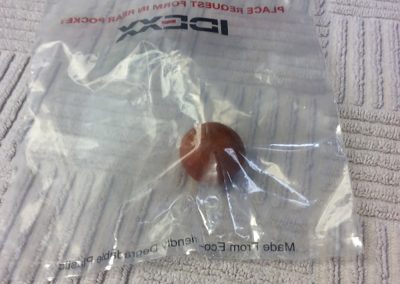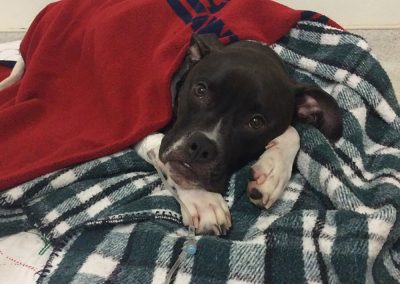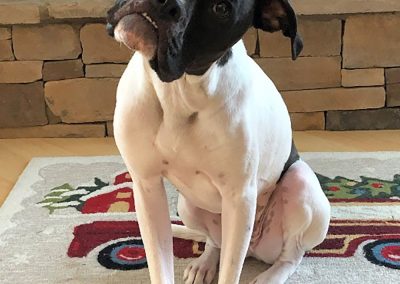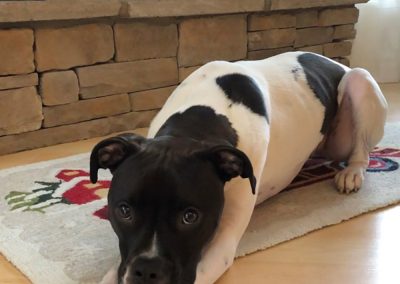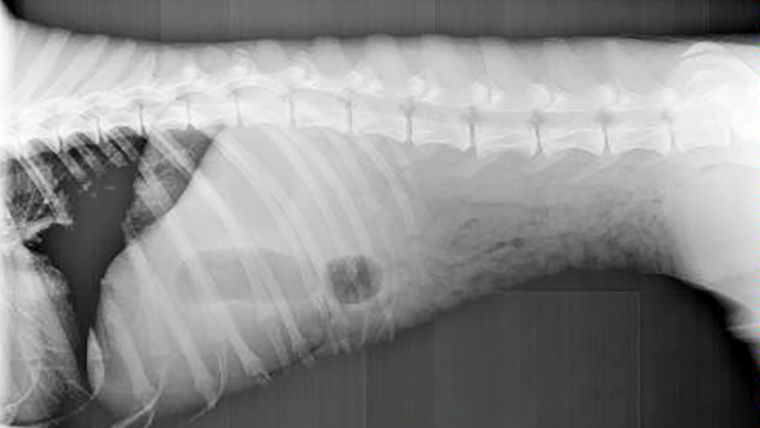
Abdominal Obstruction Treatment
Help! My dog swallowed his ball!
Winston, an exuberant and happy 1-year-old “puppy”, is usually active and playful. He enjoys days spent tossing and chewing his favorite toys. Being a young dog, he has not outgrown his playfulness, and has the unfortunate habit of occasionally chewing and swallowing pieces of his belongings. Winston was boarded over the Christmas Holiday. He enjoyed his stay but looked forward to the return of his family. However, when Winston’s owners picked him up, he was not the happy, playful puppy they knew and loved. He was quiet and overly tired. Winston would not eat his dinner, and started vomiting early the next morning. Winston’s owner took him to Longwood Veterinary Center, worried there was something seriously wrong.
Dr. Parsons VMD examined Winston and found him to be dehydrated and uncomfortable. His abdomen seemed painful and he was unusually quiet. Suspecting an intestinal obstruction, Dr. Parsons took radiographs of his abdomen and submitted them for review to our consulting radiologist, Dr. Caceras DVM, DACVR. Unfortunately, the radiographs confirmed their suspicion. Winston had a small intestinal obstruction. The only course of action was to surgically remove whatever was causing the blockage. We all had to wonder… what did he eat? It was clear there an abdominal obstruction treatment would be necessary.
Winston was taken to surgery. The cause of all his trouble soon became clear, Winston had swallowed a Nerf ball! Winston’s recovery was rapid and uneventful. He spent the night with a veterinary nurse and received medications to prevent further nausea and minimize his pain. Winston received the lion’s share of TLC and enjoyed snuggles with the nurses who made sure to keep him tucked soundly in warm blankets! Twenty four hours after surgery, Winston returned home to his grateful family.
We share this story in order to make you aware of how easily foreign bodies can occur. In fact, foreign body surgery is one of the most common emergencies seen in veterinary medicine. Occasionally, both dogs and cats will eat non-food items the body can neither digest nor pass. We have removed items as varied as socks, underwear, toys, string, dental floss and even a pair of dice from patients in the past.
Common signs of a potential foreign body ingestion include:
1. Vomiting/Pain when abdomen is touched
2. Straining to Defecate
3. Lethargy (tiredness)
4. Decreased Appetite
If you suspect your pet has consumed something they should not have, call your veterinarian immediately. Ingestion of foreign material that cannot be passed from the stomach to colon can be a life-threatening emergency. Thank you, to Winston and his parents, for allowing us to share his story with our Longwood Veterinary Center family and surrounding community.
Hugs and Kisses- The LVC Staff
Written By: Tara Corridori, LVT
Edited By: Corrina Parsons, VMD

